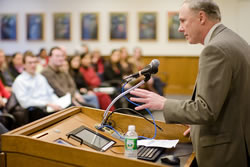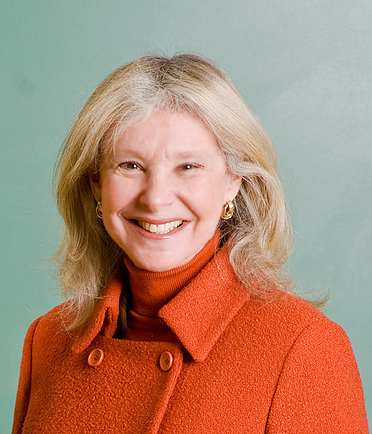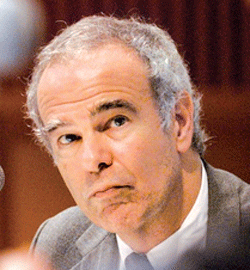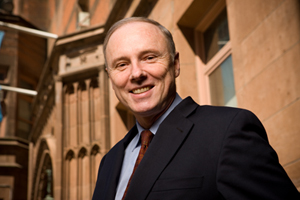What's The Big Idea?
“You shouldn’t have to buy us dinner to get us all around a table.”
That quip, by Professor of Political Science and Education Jeffrey Henig to TC President Susan Fuhrman, brought a big laugh from the 16 policy-minded faculty members at a working meal convened by Fuhrman and Provost Thomas James in October. But the line also reflected a broader truth that the evening—the first in a series of “domain dinners” this fall that will bring together faculty with related interests—was designed to address: There are huge opportunities at TC to unite people across fields and departments, but far too little has been done to capitalize on them.
Or as a faculty member from another institution told Fuhrman this past summer after participating in a review of TC’s strengths, “You have a lot of wonderful dots—if only you could connect them.”
It was for precisely that reason that last year James set in motion a series of external reviews and self-studies of TC’s nine academic departments. That process has since yielded a host of valuable recommendations, but at the core is the notion that the College must identify a set of Big Ideas to galvanize its faculty, students and staff to address some of the world’s most pressing problems.
In Fuhrman’s view, the College has all the tools to do just that.
“From the beginning, breadth has been the College’s hallmark,” she has written. “We were never just a college to prepare teachers, but also the birthplace of nursing education and nutrition education; a place where the application of psychology to education became a field unto itself; and where education is viewed as occurring not only in classrooms, but also in homes, streets, churches, communities and beyond. We have expertise in education technology, curriculum development, literacy, urban science and math education, and more. All of which uniquely positions us to grapple with problems that arise from multiple causes—which are the kinds of problems that the world increasingly faces.”
Fuhrman is adamant that whichever Big Ideas the College ultimately settles upon, they “will not be imposed from the top down, but instead, come from our faculty themselves.”
Last year’s review process made significant progress in that direction, as the reviewers presented James with a number of potential ideas suggested by faculty or growing directly out of their work. These include:
- Using schools as hubs of communities by bringing together faculty in health, nutrition, psychology, community-building, and curriculum and teaching;
- Exploring the complex relationship among behavior, learning, genetics and the environment, and then drawing, for example, on partnerships the College already has in place in regions where genomic studies are conducted;
- Understanding the role of citizenship in a global society, particularly through exploring the dichotomy of nationalism and democracy, by bringing together people in international studies, philosophy of education, history, social studies and anthropology;
- Linking knowledge about cognitive processes with efforts to better structure and individualize teaching and learning, drawing in particular on technology expertise at the College;
- And, apropos of October’s domain dinner, the notion of shaping policy across the human lifespan, drawing on in-house expertise in education economics, early childhood learning, adult education and more.
None of these ideas has been officially adopted yet, but all have been sufficiently well-received by faculty that Fuhrman and James are using them as the organizing principle for the domain dinners.
As October’s dinner showed, such gatherings are likely to be highly productive—but also, at least initially, to (what else, in academia?) raise more questions than they answer.
For example, at the policy dinner, the guests proposed no fewer than 10 distinct ideas for more specific themes around which they could all work together more closely. Among the suggestions: transitions between points and systems in the education process; creating common metrics for weighing the relative value of different education interventions; enabling policymakers to make better informed decisions by bringing them to TC for crash courses that help them frame the issues; building tools that classroom teachers can use; and distilling and applying the best education practices of other countries.
The faculty members at the dinner also debated the question of how they themselves should be organized and their collaborations structured. Some called for the creation of a formal policy department, others for measures such as new courses in which students solve a cross-disciplinary problem for a real-world client, and still others for the creation of a new “professor of practice” track at the College that helps bring policy into the classroom and vice versa.
“I hear too often from people working in schools that policy can’t help them because its messages are too unclear,” said Thomas Corcoran, Co-director with Fuhrman of the Consortium for Policy Research in Education, who is based at TC. “We’ve got to change that.”
Sharon Lynn Kagan, who as TC’s Associate Dean for Policy and Research has led efforts over the past several years to bring together policy work at the College, summed up the discussion by saying that “we’ve outlined three basic areas where we can make improvements—being proactive around common themes, increasing our capacity to educate legislators about policy, and bringing coherence to the assemblage of opportunities for students here at TC. We have to pursue them all.”
Fuhrman said she was very pleased with the discussion and promised to “fight for money and support for the ideas we come up with.”
And James closed the evening by observing that “Plato defined a symposium as a raising of glasses together with one’s colleagues. We’ve done that here tonight, and it’s been a great discussion. Now we need to do the work that makes TC the place that people look to for the next generation of thought in policymaking.”
Published Thursday, Nov. 6, 2008



